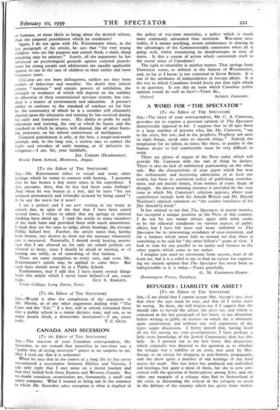A WORD FOR "THE SPECTATOR" [To the Editor of THE
SPECTATOR] SIR,—The letter of your correspondent, Mr. C. A. Cameron, provokes me to express a personal opinion of The Spectator diametrically opposed to hiS. I suppose that in all ages there is a large number of persons who, like Mr. Cameron, "say to the seers, See not; and to the prophets, Prophesy not unto us right things, speak unto us smooth things." Indeed, the temptation for an editor, in times like these, to pander to the human desire to feel comfortable must be very difficult to resist.
There are plenty of organs of the Press today which will provide Mr. Cameron with the sort of thing he desires. There is also no lack of embittered partisanship on the other side. But the characteristic of your paper which has won the enthusiastic and increasing admiration of at least one reader, has been its consistent policy of publishing contribu- tions, and not merely letters, from writers of every shade of thought. An almost amusing instance is provided by the very issue in which Mr. Cameron's criticism appears, where your contributors include both Sir Arnold Wilson and Mr. Harold Nicolson's satirical comment on "the sombre loneliness of his [Sir Arnold's] mind."
It has seemed to me that The Spectator, in recent months, has occupied a unique position in the Press of this country. I do not by any means always agree with what seems to be the editorial standpoint on various aspects of public affairs, but I have felt more and more indebted to The Spectator for its unwavering avoidance of over-statement, and for a balance which never fails to remind mc that there is something to be said for "the other fellow's" point of view. I look in vain for any parallel to its sanity and fairness in the other papers which come to my notice.
I imagine you need no encomium from anyone, least of all from me, but it is a relief to me to find an excuse for express- ing my sincere opinion that The Spectator has never been so indispensable as it is today.—Yours gratefully, Donnington Priory, Newbury. G. M. GATHORNE-HARDY.














































 Previous page
Previous page